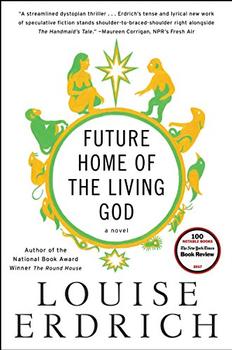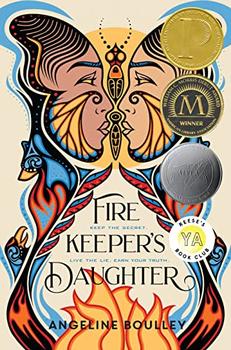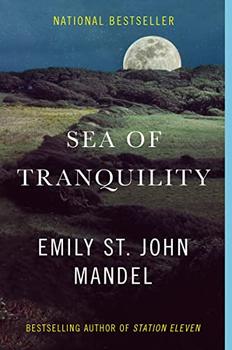Summary | Excerpt | Reviews | Beyond the book | Read-Alikes | Genres & Themes | Author Bio

Louise Erdrich began Future Home of the Living God in 2002, set it aside, and picked it up again in late 2016. To the author (and likely many others), both these years seemed like they could potentially represent the dawning of an apocalypse: 2002 because of the Iraq War, and 2016 with its exceptionally divisive presidential election. The book's 2017 publication is fortuitously aligned with a broad resurgence in dystopian literature, and in particular a renewed interest in Margaret Atwood's classic of the genre, The Handmaid's Tale, now the basis for a popular television show, with which Future Home shares many common threads. The titular handmaids of Atwood's novel are women forced to serve as childbearers to wealthy couples because of an outbreak of mass sterility. In Erdrich's version, a similar outbreak is on the horizon, resulting in fertile women being forcibly detained in birthing hospitals that are little more than prisons and impregnated against their will. While Erdrich was likely inspired by her predecessor, Future Home of the Living God is an original (and utterly terrifying) creation.
The novel unfolds as a journal written by 26-year-old Cedar Hawk Songmaker, addressed to her unborn child. The journal is meant to be "a record and an inquiry into the strangeness of things," as some sudden and remarkable shift has caused the process of evolution to begin reversing itself. As a result of this phenomenon, healthy babies are a rare commodity, and Cedar finds herself on the run from shadowy authorities called "The Unborn Protection Society" who wish to imprison her, take her baby, and use her womb to propagate the species. In these strange times, Cedar, who was adopted as an infant, meets her birth mother, an Ojibwe woman with an eccentric family. On the reservation where this family lives, a Mohawk Catholic saint named Kateri Tekakwitha (see Beyond the Book) suddenly appears with a vaguely threatening message. When the father of Cedar's child is captured and tortured, he gives up Cedar's location and she is forcibly taken to a hospital overseen by a sadistic staff. Her extended family works together to organize a thrilling escape and then attempts to hide Cedar until her baby is born.
The book's title comes from a billboard sign that Cedar observes in a field en route to the reservation, a reference to Jesus' Second Coming, but it also refers to the journal Cedar is writing for her baby. The "future home" is the world she is describing, the "living god" is her child, who is divine in her eyes, a miracle. Cedar is devoutly Catholic, and divinity is a major theme in the novel. She wonders: Has evolution reversed because God has abandoned his creation, leaving humankind "climbing back down the swimming-pool ladder into the primordial soup"? And if humanity reverts to some primitive prior incarnation, what becomes of the soul? Is it possible that a process that appears to be regressive is actually a step towards enlightenment?
Esoteric questions aside, Cedar is also battling a very real enemy, though Erdrich keeps the reader in the dark about much of the details. The U.S. Government has been overthrown, replaced by a religious organization, and Cedar is pursued by a mysterious matronly figure called "Mother," ostensibly a part of "The Unborn Protection Society," but this is not stated explicitly. This obfuscation is a clever technique that keeps the reader emotionally identifying with Cedar. The specifics of society's breakdown are irrelevant, and it is more realistic to have the facts indiscernible amid the confusion.
Erdrich imbues the novel with a sort of ludicrous humor that precludes it from becoming too dark. For example, Cedar learns that her birth name is Mary Potts, a name she shares with her biological mother, grandmother, and sister. There is an element of humbling absurdity in the discovery that she is, "just another of many Mary Potts reaching back to the colonization of this region, many of whom now worked at the Superpumper franchise first stop before the casino." There is some comfort to be found in being part of a tradition, albeit a modest one involving a gas station. While hospitalized, Cedar provides a long-winded, rapturous description of the view from her room before coming to an abrupt realization, "The elms are turning gold and come to think of it they must be giving me drugs."
Special mention must be made of Erdrich's minor characters, from Cedar's cunning and mysterious hospital roommate, nicknamed "Spider Nun," to her birth mother's husband Eddy, whose overwhelming existential ennui has caused him to draft a 3,000 page book filled with reasons he should not commit suicide.
While the book is frequently humorous, it is also haunting. Cedar's fate points to a possible future in which women's bodies are colonized and their choices about reproduction are not their own. Future Home of the Living God is smart but not pretentious. It is funny, thrilling, and heartbreaking, all without missing a beat – an impressive achievement.
![]() This review was originally published in The BookBrowse Review in November 2017, and has been updated for the
November 2018 edition.
Click here to go to this issue.
This review was originally published in The BookBrowse Review in November 2017, and has been updated for the
November 2018 edition.
Click here to go to this issue.

If you liked Future Home of the Living God, try these:

by Angeline Boulley
Published 2023
Winner of the 2021 BookBrowse Award for Best Young Adult Novel
In Firekeeper's Daughter, debut author Angeline Boulley crafts a groundbreaking YA thriller about a Native teen who must root out the corruption in her community, for readers of Angie Thomas and Tommy Orange.

by Emily St. John Mandel
Published 2023
The award-winning, best-selling author of Station Eleven and The Glass Hotel returns with a novel of art, time, love, and plague that takes the reader from Vancouver Island in 1912 to a dark colony on the moon five hundred years later, unfurling a story of humanity across centuries and space.
Your guide toexceptional books
BookBrowse seeks out and recommends the best in contemporary fiction and nonfiction—books that not only engage and entertain but also deepen our understanding of ourselves and the world around us.